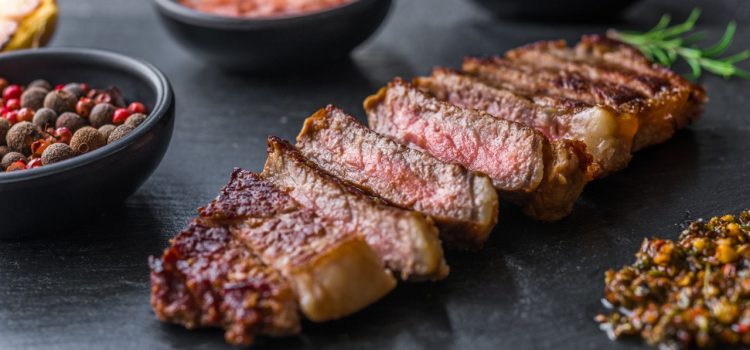
There is a lot of debate about what the best type of beef is. Some people will swear by Angus beef, while others think that Wagyu beef is the only way to go. Bear Lake Beef sides with the Wagyu crowd, and here’s why.
Wagyu beef comes from a type of red or black cattle that is raised in Japan. In fact, “Wa” means Japanese, and “gyu” means cow. These Asian cattle are thought to date back hundreds of years. Wagyu cattle were first brought to the US in 1975, with subsequent imports following in the 80s and 90s when tariffs were reduced. The meat from Wagyu cattle is known for its intense marbling and flavor. Let’s talk about why this makes Wagyu beef better than other types, and how you can get your hands on some fresh Wagyu beef delivered right to your door.
The Wagyu Difference
Wagyu beef is better than other types of beef because of the intense marbling in the meat. Wagyu cattle are raised in a specific way that results in more intramuscular fat. This fat is what gives Wagyu beef its characteristic flavor and tenderness. The marbling also makes Wagyu beef less likely to dry out when cooked, so you can expect a juicy, flavorful steak every time.
What’s the Deal with Wagyu Marbling?
In the beef industry, marbling is the fat that runs through the meat, and it is what gives Wagyu beef its superior flavor. The marbling in Wagyu beef is more evenly distributed than in other types of beef, which means that each bite will be juicy and delicious.
Wagyu cattle are also known for their high level of intramuscular fat. This makes Wagyu beef more tender than other types of beef. Wagyu cattle are fed a diet that can include corn and soybeans, which helps to produce the signature marbled look and taste of Wagyu beef.
Other Factors that Influence Wagyu Marbling
Wagyu cattle are raised in a stress-free environment. This helps to produce meat that is more tender and has a higher fat content. Wagyu cattle are also given massages and fed differently than other cattle to further promote marbling.
The Bear Lake Beef cattle raised in northern Utah are grain-finished to enhance their marbling and retain moisture. We also age our meat for three weeks to promote tenderness, making it ideal for a variety of cuts.
How to Cook Wagyu Beef
The high level of marbling in Wagyu beef means that it cooks differently than other types of beef. When cooking Wagyu beef, it is important to use lower temperatures so that the meat does not dry out. This will help to preserve the juicy, flavorful characteristics Wagyu beef is prized for.
Want more tips for cooking Wagyu beef? Check out the Bear Lake Beef collection of videos HERE.
How Bear Lake Beef Keeps Meat Fresh
The Wagyu beef delivered to our customers is flash frozen and individually packaged to promote freshness. These procedures ensure our meat is fork-tender and that it melts in your mouth once cooked.
Beef Lake Beef ships Mondays through Thursdays, whether you order a Wagyu Bundle or a single cut of beef. Choose from the following and more on our site:
- American Wagyu Rib Steaks
- American Wagyu New York Steaks
- American Wagyu T Bone Steaks
- American Wagyu Burgers
- American Wagyu Top Sirloin
- American Wagyu Sirloin Tip Steak
- American Wagyu Brisket
- American Wagyu Tenderloin
- American Wagyu Tri Tip
- American Wagyu Flank
- American Wagyu Skirt
- American Wagyu Boneless Roast
- American Wagyu Milanesa Round Steak
So what are you waiting for? Order your Wagyu beef today! You won’t be disappointed.
How You Can Get Your Hands on Some Wagyu Beef
If you’re looking for the best Wagyu beef, look no further than Bear Lake Beef! We offer fresh Wagyu beef delivery right to your door. That means you can enjoy Wagyu beef that is delicious, juicy, and flavorful without having to leave your home!
CONTACT BEAR LAKE BEEF TODAY
If you have questions about our beef, feel free to reach out today. Visit us online or send us an email to learn more about residential and wholesale orders.
